Jersey has published its budget for 2008, which includes forecast to 2012.
According to the budget all is well in the Isle. Having had a good 2006, with tax paid above expectation, it is forecasting much the same in 2007 (when tax receipts are based on 2006 profits). And it assumes the good times will continue to roll. This is a summary of their projections:
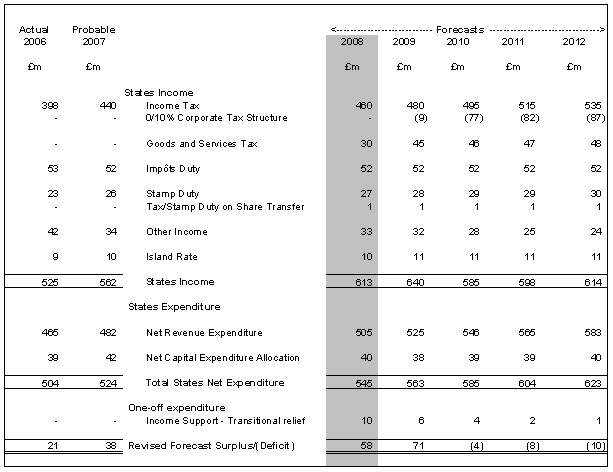
Near as makes no difference there is an implicit growth rate of 5% in the top line, which is the only line that makes this whole equation work. But, as the notes say:
The 2008 revenues are based on specific assumptions about the increase in taxable profits, earned and unearned income for 2007. These forecasts are cautiously optimistic but do not and can not make specific adjustment for the recent 'credit crunch' as figures are not yet available.
I think the term 'cautiously optimistic' is a little wide of the mark. The 'credit crunch' is on the offshore financial markets. It's the SPVs, SIVs and CDOs that are based in Jersey and elsewhere that are being wiped out. New issues are not happening. This credit crunch is not a stage removed from Jersey, as for example the 2000 downturn was. This one is bang in the centre of St Helier for all practical purposes.
So its important to look at what happened the last time Jersey experience the boom times. This graph shows trends in Jersey tax revenues, and is from its 2004 budget (not on line):
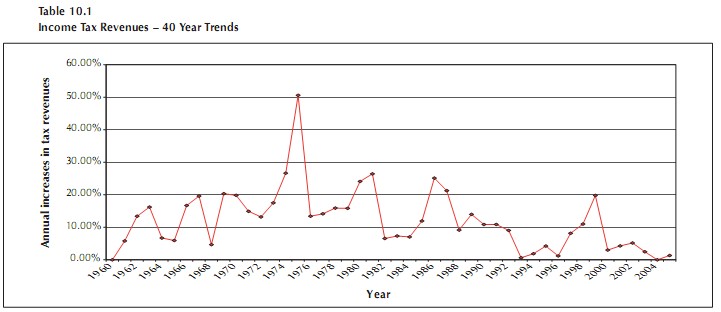
In booms (1984 - 87 and 1996 - 2000) Jersey sees very high tax growth. Afterwards it can flat line. It does whenever there is a downturn in the market (1993 - 1996 and 2000 - 2005).
This graph shows that, again from the 2004 budget and showing real revenues to 2003 and anticipated 2004:
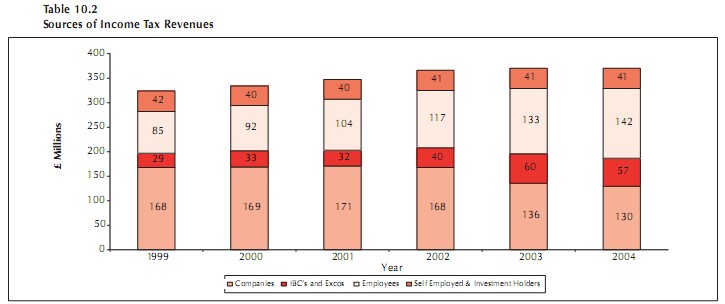
The top line would read:
1999, £324m
2000, £334m
2001, £347m
2002, £366m
2003, £370m
2004, £370m.
The actual income in 2004 was, according to the 2006 budget £363m and 2005 was £370m. So, for five years (2001 - 2005) real growth was 1.5% on aggregate, and effectively 0% from 2002 to 2005 inclusive, a real decrease when inflation is considered.
But on the back of two good years Jersey is now forecasting growth of 5% when there is every sign that it's only core business sector is in crisis. 0% might be a good substitute.
And the loss from 0 / 10 needs to be properly stated. It is not £77 million on 2010 - even Senator Le Sueur admits it is much higher than that now. I estimate (using his own data) that it is at least £118 million, which will of course rise with inflation. So, let's substitute growth at a generous 1.5% and this real loss into the forecast and this is what happens:
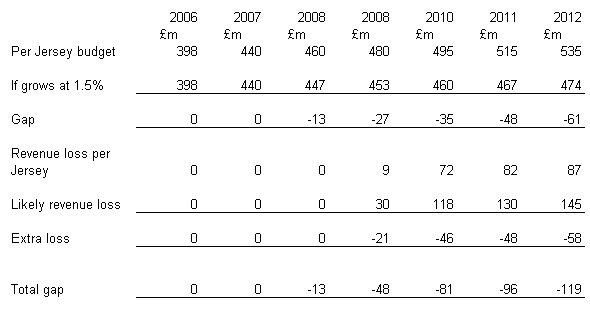
But that's not the end of the story. It's ludicrous that the Budget is based on an estimate of the impact of 0 / 10 calculated in 2005. Tax revenues that year were £370 million and the revenue loss was estimated to be £85 million and income from companies which will give rise to the loss was just £186 million (source, 2006 budget). In 2008 the headline income take from companies is £228 million. Just scale the tax loss up in proportion to that and it has to be £100 million in 2010. If Senator Le Sueur's estimate is under by this sum mine must be as well. That results in the following table, for now:
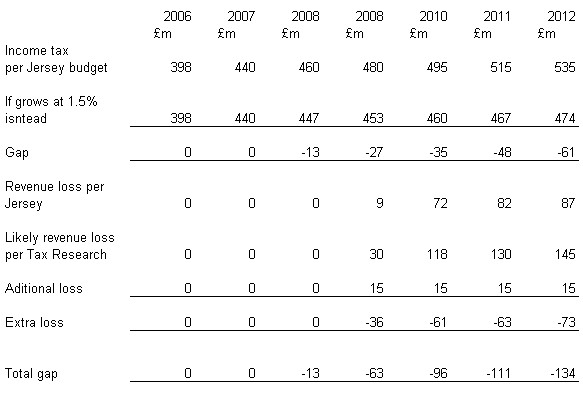
The conclusion is obvious. Jersey is not going to break even. Jersey has a massive black hole.
And even this assumes that the massive increase in tax income over the last couple of years can be sustained, and there is no evidence that this will be the case given the size of the credit crunch and its relevance to Jersey.
Put nicely, the place is going bust. Not quite as fast as Northern Rock maybe, but just as certainly.
I wonder when the financial services industry will begin to bail out?
NB Article updated 13.35 26.11.07
Thanks for reading this post.
You can share this post on social media of your choice by clicking these icons:
You can subscribe to this blog's daily email here.
And if you would like to support this blog you can, here:



[…] he admitted, as I had predicted that he would have to, that the ‘black hole’ in Jersey’s finances is bigger than […]
[…] black hole is getting bigger, its financial services sector more innovative in promoting abuse and wishing to […]
[…] the reality of financial transactions which have real cost to society. They will also have a torrid year financially as the securitisation, hedge fund and private equity markets that provide serious quantities of […]
[…] had not read my materials on the black hole facing Jersey. He was however familiar with the financial problems facing Guernsey. He thought that […]
[…] a tax haven. That price will increase. That is inevitable. Jersey is going broke. I have shown why that is also inevitable. Put simply,if any country forgoes at least 20% of its revenue, had no plan to cut its expenditure […]
[…] I’ve said, and what this cryptically confirms: there’s a mighty big black hole awaiting Jersey into which it could topple with the greatest of ease, not least because all its […]
[…] significance is this: Jersey has a massive tax ‘black hole’. It can only survive with 5% growth. It is obvious that 0% will be good: recession is likely. That […]
[…] significance is this: Jersey has a massive tax ‘black hole’. It can only survive with 5% growth. It is obvious that 0% will be good: recession is likely. That […]
[…] have, for some time, said that Jersey and Guernsey will both go bust within the next few years because it is quite impossible for them to […]
[…] I have shown why Jersey is at risk of going bust here. […]
[…] in 2007 when Jersey published its business plan for 2008 I said its predictions were ludicrous. They claimed the following at that […]
[…] in 2007 when Jersey published its business plan for 2008 I said its predictions were ludicrous. They claimed the following at that […]